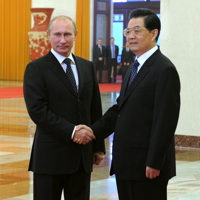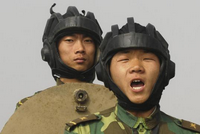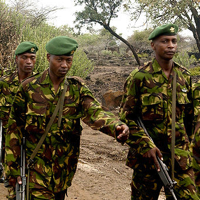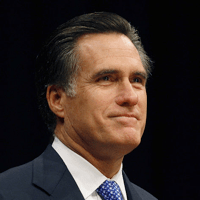Some 3,000 U.S. and Filipino marines have begun two weeks of joint training drills, including a hostile beach-assault exercise near the Spratly Islands — a patchwork of islets and atolls at the center of maritime territorial disputes in the South China Sea. While U.S. military officials assert the drills are not aimed at China or any other country as a specific target, Marvin Ott, an Asia expert at the Woodrow Wilson International Center for Scholars, says they represent an obvious strategic move by Washington to counter growing Chinese efforts to claim sovereignty and exert dominance over the South China Sea. […]
Diplomacy & Politics Archive
Free Newsletter
Turkey’s energy minister announced earlier this month that the state-owned gas company BOTAS would not renew a gas deal with Gazprom when it expires in December due to a pricing dispute. In an email interview, Hasan Selim Ozertem, a researcher at Turkey’s International Strategic Research Organization, discussed Turkey-Russia energy relations. WPR: What is the nature of Turkey and Russia’s energy relationship, including gas and nuclear energy? Hasan Selim Ozertem: Russia is Turkey’s main energy supplier, with their energy relationship dating back to the Cold War period. In the post-Soviet era, relations have been positive, particularly in the area of natural […]

A new report from the Stockholm International Peace Research Institute has shed light on one of most important developments in the international arms trade market of the past 10 years: the decline in Russian arms sales to China. While diplomatic relations between the two powers remain relatively strong, their trade in arms has collapsed since the middle of the last decade. The cause of this collapse stems not from any substantial political conflict between the two, but rather from “ordinary” tensions that afflict great power relations. While the greatest immediate impact of this development will be felt by Russia and […]
The deployment of 100 U.S. troops to advise in the fight against Central Africa’s Lord’s Resistance Army has triggered speculation about the precise role such troops will play and the extent to which they may engage in combat without express congressional approval. It’s generally agreed the troops are Special Forces sent to help Ugandan and Congolese soldiers gather intelligence and coordinate logistics. But questions remain about how far they’ll go toward using more robust U.S. capabilities, like UAV drones, to potentially take down the LRA’s notoriously violent leader, Joseph Kony. “A possible scenario,” according to Geoffrey Corn, a former military […]

The reaction in much of the Western press to Russian Prime Minister Vladimir Putin’s proposal of a Eurasian Union at the beginning of October was more or less predictable to longtime Russia watchers. Familiar accusations of Russian neo-imperialism and wild claims about a “new Soviet Union” abounded, feeding into a general narrative of Russia as a looming threat that must be contained. These fears are premature, to say the least. As Richard Weitz pointed out in his WPR column last week, the idea of some form of overarching supranational organization for the post-Soviet states has been a hallmark of Russian […]
Mexico’s economy minister sent China a formal letter last month expressing concern over unfair trade practices used by certain Chinese firms to avoid customs duties. In an email interview, Rhys Jenkins, a specialist in China’s trade relations with Latin America at the University of East Anglia, discussed the trade relationship between China and Mexico. WPR: What is the history of China-Mexico trade ties? Rhys Jenkins: Trade between Mexico and China has grown spectacularly over the past decade from a little more than $3 billion in 2000 to almost $50 billion in 2010. The trade balance, however, has been massively in […]

China-Russia relations took another step forward during Prime Minister Vladimir Putin’s visit to Beijing last week. With the Arab Spring throwing the two governments into an unexpected alliance at the United Nations this year, the visit marked the continuation of attempts to build a deeper and less volatile bilateral relationship. The two sides signed off on trade deals worth $7 billion, demonstrating a tangible effort to move beyond energy-based economic ties, while Putin suggested a greater focus on China for the Kremlin’s foreign policy after the recent period of rapprochement with the U.S. This suggests that, although mistrust and suspicion […]

Last week, on a study trip to Turkey for U.S. foreign policy specialists sponsored by the Confederation of Businessmen and Industrialists of Turkey (TUSKON), I traveled to Ankara, Hatay and Istanbul to meet with government officials, academic and think tank experts and business leaders. While there, we discussed many issues, including the remarkable health of the Turkish economy, the domestic political scene, the increased tolerance for expressions of Kurdish and Islamist identities, and Turkey’s relations with other countries. But perhaps the overarching theme tying all these issues together for us was the “Whither Turkey” question. For decades the Republic of […]
Senegal’s president is facing the most serious political unrest of his career just months before seeking re-election to a third term. This report produced by the U.S. government-run Voice of America examines the movement aligned against him with particular focus on a group of young Senegalese musicians and journalists called “Y’en A Marre” or “We’ve Had Enough”.
Earlier this month, Brazil sent 300 troops to join UNIFIL, the U.N. peacekeeping force in Lebanon. In an email interview, Kai Michael Kenkel, a professor at the Institute of International Relations at the Pontifical Catholic University of Rio de Janeiro, discussed Brazil’s peacekeeping operations. WPR: What is the history of Brazil’s involvement in international peacekeeping missions? Kai Michael Kenkel: Brazil is a strong supporter of the U.N. and started participating very early in U.N. peace operations, notably the U.N. Special Committee on the Balkans in 1947 and the U.N. Emergency Force (UNEF) in 1956 following the Suez crisis, which was […]

There exists within the Pentagon an unshakeable line of reasoning that says the Chinese military threat to the United States in Asia is profound and growing, that the most likely great-power war conflict will be over Taiwan or the South China Sea, and that the primary trigger will be China’s burgeoning — and uncontrollable — nationalism. Objectively, China’s military capabilities are certainly growing dramatically, but our conventional wisdom tends to break down in the structural plausibility of the scenarios. That’s why the firm belief that rampant nationalism will trigger an eventual conflict becomes so crucial, especially when considered in combination […]

LAMU, Kenya — Supported by military planes and helicopters, Kenyan tanks, military trucks and columns of troops streamed across the Somali border Sunday in coordination with Somali government soldiers. Initially reported by locals, the operation was soon confirmed by Kenyan government spokesmen. The mobilization comes in the wake of a spate of kidnappings along Kenya’s vast, porous border with Somalia that prompted the Kenyan government Saturday to effectively declare war on al-Qaida-linked Al-Shabaab militants. Delivering a joint statement with the country’s top security chiefs, Internal Security Minister George Saitoti vowed to pursue the group in both rural and urban areas. […]

In her WPR column yesterday, Frida Ghitis noted that the global chessboard is being “reset” as countries re-examine longstanding partnerships and alliances, both formal and informal, in the face of broad geopolitical changes taking place today. “As a result,” wrote Ghitis, “the coming months and years will bring about a recasting of important strategic links, some of which have been part of the global landscape for decades.” The evidence of this transformation can be found across the Middle East and South Asia, as a result of the Arab uprisings, but also due to the Afghanistan War, which has strained U.S. […]

Thirty years of globalization has propelled widespread economic growth across Southeast Asia. In recent decades, the number of people in the region living on less than $1.25 a day has dropped by half. Yet, these positive development trends are accompanied by a darker side of globalization: trafficking in drugs and small arms, piracy, human smuggling, the marketing of counterfeit goods and nuclear proliferation. The size and scope of these challenges threaten to undercut the remarkable gains of the past quarter-century. Preserving those gains will require collaboration between Southeast Asian governments, the identification of novel streams of security and development assistance […]
